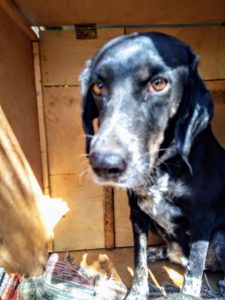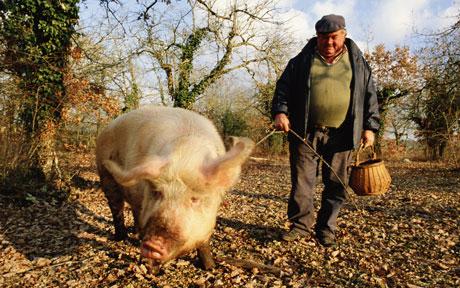“What is the best breed of truffle dog?” is an interesting question and one commonly asked. However it may be difficult to find a straightforward, helpful answer amongst all of the information and lists. These tend to focus on the ten most common truffling breeds or the characteristics of the best truffle dogs……
- Good nose
- Thick coat
- Likes sauages …….etc
The quick answer to the question is that there are many breeds which make excellent truffle dogs. If this is not especially helpful that’s because we are asking the wrong question. Rephrasing the question to “What is the best breed of truffle dog for me?” makes it easier to start with some suggestions.
If you are considering getting a truffle dog you need to think about your own characteristics before you start thinking about those of the dog. That means that, in addition, to the usual practical considerations all potential dog owners must weigh up, potential hunters also need to take a cold, hard look at their own strengths and weaknesses..
How much experience do you have with dogs? What about your personality – are you laid-bac, energetic, fit? Can you only hunt at weekends? Are you ambitious -are you aiming to make a living out of hunting professionally?
Most decent hunters would agree that the key factor is not the breed of dog but that man and dog make a good match. A truffle hunter is entirely useless without his dog. The pair work as a team and if the two are well suited they can operate in seamless synchronizatio
Experience Level
This is perhaps the main factor to consider. If you are new to truffling it is often preferable to begin with low energy dogs who tend to stay close at hand and will follow you around sniffing out the general area around the path you tread together. This is why the lagotto is such a popular little dog. Unlike other more adventurous breeds, the lagotto is unlikely to run off chasing other wildlife – these instincts have been bred out over the centuries. As well as being easy to train and having an excellent nose, these dogs generally have an easy-going nature. These traits make the Lagotto Romagnolo the ideal truffle dog if you are just starting out or if you don’t have a great deal of experience with dogs.
Another favourite breed amongst novice hunters is the labrador. This is another sociable and affectionate dog that does not like to be alone. Labradors rarely leave your side as you explore the forest together at your own pace. Although they are naturally exuberant as pups, they mature relatively quickly compared to other breeds. Even if you do not have had much to do with dogs, labradors are highly intelligent, fast learners and so are usually a breeze to train.
Stamina
How often will you hunt and for how long? Many hunters can’t wait for each of the truffle seasons to start and like to be out in the forest all day every day. Others might make less frequent and much shorter hunting trips Generally speaking, if you want to hunt seriously then think about getting a larger, high-energy breed like the wire-haired pointer. Conversely, since these hunting dogs thrive on exercise and activity, avoid them unless you intend to go out on a regular basis.
Whereas the larger hunting hounds seem to have boundless energy, smaller dogs such as lagottos and heavier set breeds like labradors may tire easily. The lagotto has small paws and although it may start digging with great gusto, after a while the dog starts to flag. As well as being unfair to exhaust your truffle dog, it is also an inefficient way to hunt. Tired dogs lack concentration and can’t detect truffles as well.
Lagottos, though, are the perfect dog for both the very inexperienced and the older, perhaps less fit, half of the hunting team. Although they are playful and energetic, they don’t mind staying home and pottering round the garden.
Other dogs would certainly not like it. Our pointers do not want to sit off at home and have a little rest, gnawing on a bone under a tree. They really want to be out hunting and will leap around all day for three months solid if you let them. They never seem to tire and are always raring to go first thing in the morning, sitting impatiently in the car before you have even got your boots on.
They protest loudly if they suspect they are not included in that morning’s team of dogs and their days off are spent at home in a sulk When they are out on the hunt they are the happiest dogs you can imagine but they rarely trot along calmly beside you. All the pointers (wire-haired, short-haired and Bracco) are very fast. They cover vast tracts of terrain so hunters need to have plenty of stamina to hot foot it behind them as, nose in the breeze, the dogs race after the airborne scent of the truffle.
Fitness
Most dogs are fit but not all hunters are in their best physical shape. If you are not up to running around for hours then it makes sense to steer clear of the previously mentioned athletic breeds . Smokers and slow walkers are not well matched with wire-haired pointers, griffons or any of the more boisterous doggos.
However if you are moderately fit and can cope well with a sustained brisk walking pace then a springer spaniel might be a good match. This breed is active without being hyper. Springers hunt by your side but will also run around covering a wider area. This keeps your truffling options open.
Do you intend to train the dog yourself?
There are several benefits to training your truffle dog yourself. Cost is probably the most frequently cited advantage as you can definitely save yourself a few euros. A dog which has been trained to find white truffles but has little to no experience in the field will cost at least 2,000 euros. An older truffling dog with a proven track record will set you back over 5,000.
Another reason to train your dog yourself is that you will enjoy it – it is tremendous fun. If you love dogs and have time and patience then it is not too difficult to teach a dog to hunt truffles. You will develop a closer bond with your dog have a better understanding of each other. The dog/hunter relationship is one of the most important factors in truffling. Doing your own training gives you the invaluable chance to learn all about your dog’s personality as it develops. You will have a greater insight into what your dog responds to, the challenges it enjoys, its needs and its limits. Through training, the dog learns about you. The two of you will form a team, spending long hours together, often alone, in quiet forests. All successful partners need to know how to communicate with one another. A great truffle dog can communicate just with its eyes that it has found a truffle. Other dogs might bark to signal that they have found something and sit at the spot wagging their tail waiting for the hunter to arrive before they start to dig it up.
Another reason for DIY training is that you know what you are getting, In the past, we have bought dogs that were skittish or aggressive either with people or with the other dogs. We were never sure what training methods had been used and whether the dog’s character traits were inherent or a result of cruelty. If you buy a trained dog, don’t do it online if you can help it. Get to know the trainer well and make sure that only humane training methods have been used. There are some trainers who see dogs as a tool and not much more than a way to earn money. They try to train multiple dogs at once to maximize profit and so need to look for quick fixes.These may take the form of barbaric methods such as electrocution to keep dogs in line.
If you decide to undertake the training yourself and it is your first dog, you could do a lot worse than chose a labrador. Lagottos are just slightly more difficult to train but truffle hunting seems to come more instinctively to them so they tie for first place with labradors. Springer spaniels are more demanding but they are manageable. The larger breeds of dog need careful handling. They can be wilful and stubborn and may prove too much for the first time trainer.
It goes without saying that training takes time. It will take between a year and 18 months to train a female dog. Most males take a whole year more until they are ready to start hunting seriously. Be prepared for a lot urinating on trees, going on long runs after rabbits and rolling around in various poos before you do any actual truffle hunting. I’m talking about the dogs here, not the hunters. Although if you want to engage in these activities, that’s your call.
Other breeds
 Our Best Girl
Our Best Girl
To end, I would like to speak out in support of the mutt, the mongrel, the mixed-breed. Even though the classic truffling breeds do tend to be more reliable as hunters, that doesn’t mean that other dogs are entirely unsuitable. In fact, some of the best truffling dogs are cross breeds. Most dogs have a fantastic sense of smell. If the dog is also smart, obedient and loves to play then it can be trained to hunt out truffles! Good luck to you all!



 Our Best Girl
Our Best Girl
